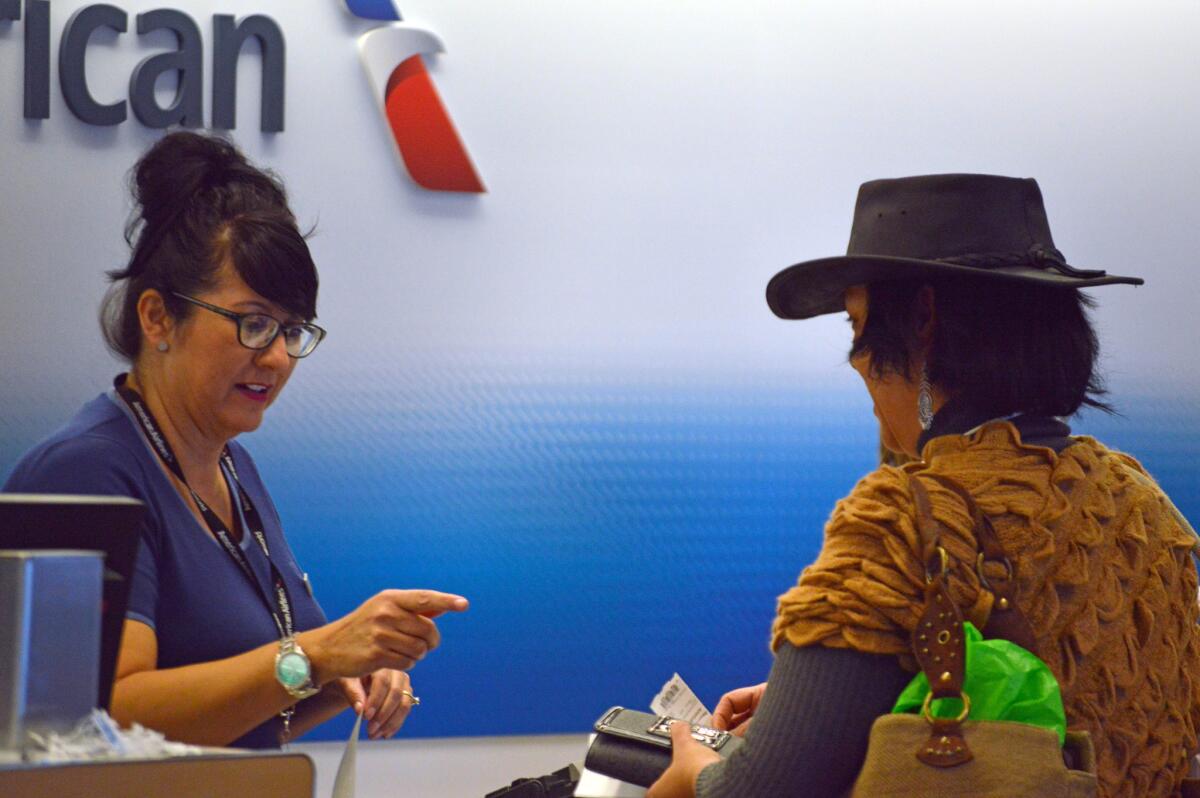The facts on Real ID and TSA-compliant ID cards for senior citizens

- Share via
I just finished reading the Feb. 14 “On the Spot” (“You Have License to be Frustrated”). In it, Real ID driver’s license compliance was discussed. Here are my questions: My mother-in-law is 91, lives in California and doesn’t have any immediate travel plans, but her driver’s license has expired. What do we need to know about getting a compliant piece of identification? Second, will a Global Entry suffice instead of a driver’s license?
Victoria Wells
Medford, N.J.
Answer: Don’t panic just yet. You still have a couple of years before Real ID requirements take effect.
For those who may have missed that column and are wondering what fresh hell this is, here’s the scoop:
Federal legislation dating to 2005 mandates that driver’s licenses or state IDs meet federal requirements. There has been much backing-and-forthing about how this can be done — you’ll note that it’s been more than a decade since the law was enacted — but the Department of Homeland Security has set a deadline for state compliance of Jan. 22, 2018.
To see whether your state’s driver’s license complies, go to the DHS Real ID site. If you’re from California or New Jersey, I can save you the trouble: They do not. But, again, try to tamp down the lump of panic rising in your throat. This shouldn’t be an issue for air travelers until 2018 and possibly later.
It shouldn’t be an issue at all if you have a Global Entry card. The Transportation Security Administration also will accept a U.S. passport, a U.S. passport card, a U.S. military ID and more. You can see the list of acceptable identification at the TSA site.
Remember, though, that Global Entry is good for just five years, so check the date on your card. The Global Entry program costs $100 and requires an application and an interview.
You are not automatically assured of getting admitted to the program (criminal history, Customs violations or other problems may derail you), although 2.8 million people have so far joined. You can read about how to apply at the Customs and Border Protection.
Besides getting an ID that may work if your state-issued driver’s license does not, you will also be able to speed through domestic airport security and use the faster-than-standing-in-line kiosks when you come back through Customs upon returning to the U.S.
Let’s put Real ID compliance aside for a moment to address the issue of Wells’ mother-in-law because it won’t interfere with her ability to get on a plane for at least two years.
But something else will.
Her driver’s license is expired.
A TSA rep pointed out this requirement on its website: “Adult passengers 18 and over must show valid identification at the airport checkpoint in order to travel.”
Oh-oh.
At 91, Wells’ mother-in-law may no longer be driving, so she would probably need a California ID card. A senior citizen version is available for people older than 62 that is good for 10 years. (Non-senior cards are available in six-year increments.)
If the person is infirm, “Family members of a person suffering from Alzheimer’s or other debilitating illnesses can obtain an ID card for their loved one,” said Jaime Garza of the California Department of Motor Vehicle’s Office of Public Affairs in an email. California also has a Senior Driver Ombudsman program, Garza said, “in which family members can speak with someone who can assist with senior driver related issues.” For information on that, go to the Senior Driver Ombudsman site or call (310) 615-3552.
TSA does have other ways to verify identity, and an expired driver’s license along with another form of identification with a photo on it may work, for now anyway.
It’s unknown whether that may change when Real ID becomes the prevailing law of the land. That joins a host of other unknowns for this vexing, confusing process, including whether 25 million of us Californians have driver’s licenses that will no longer be enough to get us on a plane. For now, that’s not a problem we travelers can solve. As we are fond of saying in this office, “Not my circus, not my monkeys.” Until it is.
Have a travel dilemma? Write to travel@latimes.com. We regret we cannot answer every inquiry.
Sign up for The Wild
We’ll help you find the best places to hike, bike and run, as well as the perfect silent spots for meditation and yoga.
You may occasionally receive promotional content from the Los Angeles Times.




